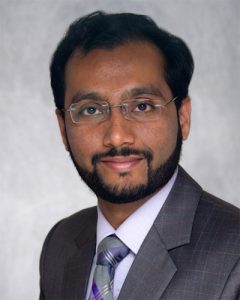Dr. Ishan Bhatt came to UNCG as an Internal doctoral student from India. He graduated with his PhD in Communication Sciences and Disorders (CSD) from UNCG in 2013. Since that time, he has become a successful teacher, researcher, mentor, and scholar in the field of Audiology (hearing sciences).
Dr. Bhatt has begun a nationally recognized track of cutting edge research that is investigating the role of genetics in chronic tinnitus(ringing in the ears) and noise-induced hearing loss. He began his work in the Academy at the Northern Arizona University, where he got tenure and was promoted to Associate Professor.
Recently, he has gone to work at the University of Iowa, which has one of the highest ranked CSD programs in the USA. He has been successful in obtaining Federal grants to support his work in tinnitus and genetics as listed below in his CV and BioSketch. Dr. Bhatt is not only a great researcher, but he has distinguished himself as a great teacher as well.
In 2018, he was named Teacher of the Year at Northern Arizona University. He describes his teaching philosophy as follows:
“I believe that the teaching styles of a graduate-level instructor should be more adaptable to meet discipline-specific requirements. My graduate classes include theoretical discussions about controversial topics, clinical case studies, and hands-on clinical learning assignments.
These activities are effective for developing self-authorship in learning, critical thinking, diverse reasoning, and problem-solving. In my classes, you will see an interdisciplinary teaching approach that improves students’ learning experiences. Guest speakers from multiple disciplines are invited to discuss their perspectives on communication disorders.
Interested students are provided opportunities to work under the direction of a research team a my Audio Genomics Research Lab with other students and experts from the fields of audiology, biology, genetics, biostatistics, and pharmacology. Learning is a dynamic process, and so the teaching philosophy cannot be static.
A conscientious instructor must continuously evaluate the effectiveness of the underlying teaching philosophy with objective and unbiased assessments and must modify it in light of new research evidence. I believe that professionally successful and personally satisfied individuals can be evolved when instructors and students are open to receive new knowledge.”
